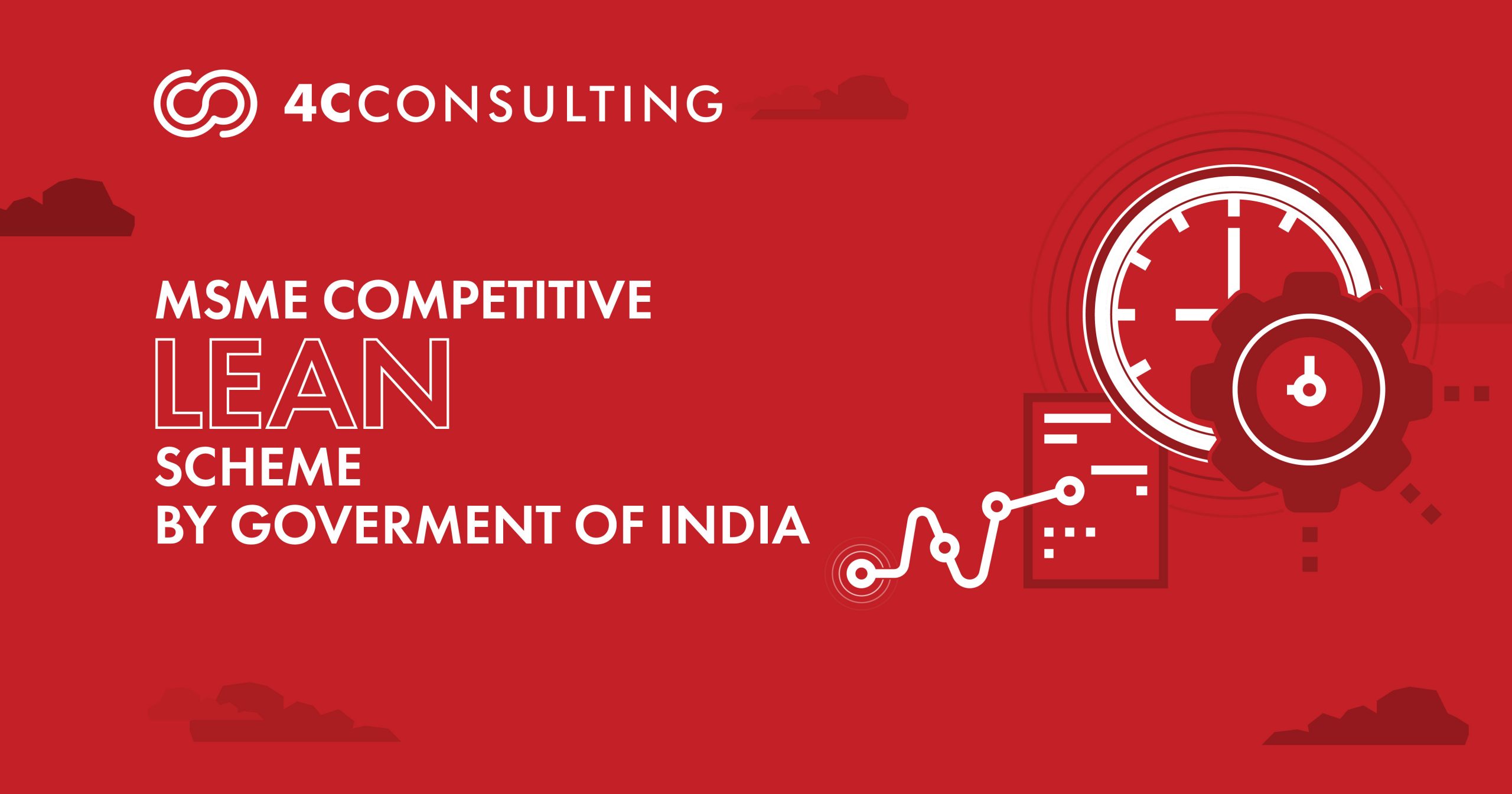
MSME COMPETITIVE LEAN SCHEME: MSME’S COMPETITIVE SCHEME BY GOVERNMENT OF INDIA
3rd May, 2024
In today’s competitive market, the vitality of Micro, Small, and Medium Enterprises (MSMEs) is undeniable. Addressing this, the Government of India introduced the MSME Competitive (Lean) Scheme, designed to boost MSMEs’ operational efficacy and market presence through Lean management principles. This blog outlines the Lean Scheme, discussing its structure, incorporated Lean tools, objectives, available subsidies, and its benefits, providing a comprehensive overview for MSMEs aiming to enhance their competitiveness.
.
WHAT IS MSME’S COMPETITIVE LEAN SCHEME?
The Lean Scheme is a strategic initiative under the Ministry of Micro, Small, and Medium Enterprises designed to improve the competitiveness of MSMEs by incorporating Lean manufacturing principles. This scheme encourages MSMEs to enhance their operational efficiencies by minimizing waste and maximizing process effectiveness. The focus is on continuous improvement in their production and service delivery, facilitating better resource management, cost reduction, and improved service delivery to meet the dynamic demands of both local and international markets.
.
Lean Scheme Levels and subsidies:
Under the Lean Scheme, MSMEs can benefit from subsidies at different levels to support their adoption of Lean principles and practices. These subsidies are aimed at making Lean implementation more accessible and affordable for MSMEs of varying capacities. The scheme offers financial support for consultancy fees, training, and other expenses associated with Lean implementation.
- Basic Level: At this initial stage, MSMEs embark on their Lean journey which lasts for 2 months. This level offers free introductory training and consultancy services, providing the foundational knowledge of Lean concepts and tools. It is designed to get participating enterprises acquainted with the basics of Lean, setting the stage for more advanced practices.
- Intermediate Level: After completing the Basic Level, MSMEs progress to the Intermediate Level, a more intensive six-month phase of Lean implementation. Here, they receive a subsidy covering up to 90% of consultancy fees, with a cap of ₹1,20,000. This financial support is intended to help MSMEs dive deeper into Lean strategies and tools, thereby enhancing their operational efficiencies.
- Advanced Level: The highest tier in the Lean Scheme is the Advanced Level, which involves a twelve-month, in-depth program focusing on advanced Lean methodologies. At this stage, MSMEs benefit from substantial support, receiving a subsidy that covers 90% of consultancy fees up to ₹2,40,000. This level is aimed at empowering MSMEs to fully integrate and sustain advanced Lean practices, ensuring they can maintain their competitiveness in the market.
.
Lean Tools:
The Lean Scheme promotes a diverse array of Lean tools focused on enhancing the efficiency and quality of MSME operations. These tools are integral to optimizing various aspects of production and operations:
- 5S: Improves efficiency and safety by organizing and maintaining the workplace orderly; it includes sorting, setting in order, shining, standardizing, and sustaining.
- Kanban: A visual management tool that controls workflow and inventory at the production level to facilitate just-in-time manufacturing and minimize waste.
- Kaizen: Encourages ongoing, incremental improvements across all staff levels, from top management to frontline workers.
- Value Stream Mapping: This tool involves the analysis and visualization of material and information flows to streamline the entire production process.
- Poka-Yoke: An error-proofing technique designed to prevent and correct process errors, thus enhancing quality and reliability.
- Jidoka: Enables both machines and operators to halt production when a defect occurs, supporting autonomous quality control.
- Just-In-Time (JIT): Reduces carrying costs of inventory by producing goods only as needed, aligning production closely with demand.
- Total Productive Maintenance: Focuses on achieving flawless production by preventing breakdowns, slow running, and defects to improve equipment efficiency.
- SMED (Single-Minute Exchange of Dies): Aims to reduce equipment setup times to less than 10 minutes, thereby increasing operational flexibility and reducing batch sizes.
- Andon: A visual aid that provides real-time status updates on the production line to quickly address issues and maintain continuous flow.
- Gemba Walks: Involves leaders visiting the actual work site to observe issues, engage with employees, and foster a transparent organizational culture.
- Takt Time: Aligns the rate of production with customer demand to ensure a smooth and balanced production flow.
- Heijunka: Smooths out the production schedule to manage variability in customer demand by producing in a regular sequence.
- Hoshin Kanri: A strategy deployment tool that links strategic goals with specific operational actions necessary for their realization.
- Visual Factory: Utilizes visual cues to improve communication, direct operations, and enhance transparency throughout processes.
Each of these tools is tailored to address specific inefficiencies within the enterprise, ensuring that MSMEs can streamline their operations and maintain a competitive edge. By integrating these Lean tools, MSMEs can achieve significant improvements in productivity, quality, and overall operational excellence.
.
OBJECTIVES OF THE LEAN SCHEME:
- Resource Optimization: The primary goal is to optimize the use of materials, manpower, and machinery, ensuring these resources are utilized efficiently to maximize output and reduce waste.
- Quality Enhancement: The scheme encourages the adoption of Lean principles to boost the quality of products and services, aiming to meet and surpass customer expectations and solidify a reputation for high standards.
- Adoption of Industry 4.0 Technologies: It facilitates MSMEs’ transition into digitalized operations by introducing them to Industry 4.0 technologies, which include automation and data analytics to enhance operational efficiency.
- Skill Development: By engaging with Lean methodologies, MSMEs acquire essential skills and knowledge, promoting a culture of continuous learning and improvement within their operations.
- Reduction of Rejection Rates: Implementing Lean practices helps in decreasing the rates of defects and rejections, thereby elevating product quality and boosting customer satisfaction.
- Productivity Improvement: The scheme helps streamline processes and eliminate redundancies, enhancing productivity and enabling quicker responsiveness to market demands.
- Profitability Increase: Improved operational efficiency and quality lead to heightened profitability and support sustainable growth for MSMEs.
- Digital Empowerment: MSMEs are equipped to use digital tools effectively, fostering innovation and ensuring they remain competitive in the digital era.
.
BENEFITS OF THE LEAN SCHEME:
- Operational Efficiency: By streamlining processes and minimizing waste, the scheme significantly enhances operational efficiency and reduces costs.
- Cost Reduction: Lean practices cut down on non-essential activities and fine-tune workflows, translating into notable cost savings and improved financial health for MSMEs.
- Quality of Service and Product Improvement: Focused process optimization under Lean principles enhances the quality of services and products, diminishing defects and lowering customer complaints.
- Employee Engagement: Involving employees in ongoing improvements cultivates a sense of ownership and empowerment, which boosts morale and increases productivity.
- Risk Management: Lean principles aid in identifying and mitigating potential risks, enhancing organizational resilience and minimizing potential financial losses.
- Innovation and Adaptability: A culture of continuous improvement under the Lean framework encourages innovation, helping MSMEs adapt and thrive in a changing business landscape.
- Enhanced Supplier Relationships: Improved collaboration with suppliers through Lean practices leads to more efficient supply chains and reduced procurement costs.
- Environmental Impact: The scheme promotes environmental sustainability by reducing waste and minimizing energy consumption, aligning with broader sustainability goals.
- Sustained Growth and Viability: The Lean Scheme provides MSMEs with the necessary tools for sustainable growth, ensuring long-term viability and success in an increasingly competitive and environmentally conscious world.
.
The MSME Competitive (Lean) Scheme by the Government of India significantly elevates the operational capabilities and competitiveness of micro, small, and medium enterprises. Through a structured approach incorporating Lean management principles, this initiative provides tiered support from basic to advanced levels, along with a comprehensive toolkit comprising methods like 5S and Kanban. These tools and practices not only optimize resource use and enhance product quality but also foster continuous improvement and innovation. Ultimately, the Lean Scheme prepares MSMEs for sustainable growth and robust competitiveness in both local and global markets, ensuring long-term viability in an ever-evolving economic landscape.
.
HOW 4C CONSULTING HELPS YOU TO IMPLEMENT MSME COMPETITIVE LEAN SCHEME?
Partner with 4C Consulting Private Limited to guide your business through the process of achieving MSME Competitive (Lean) Certification. Our NPC registered consultants, with over 15+ years of experience in implementing Lean, 5S, Kaizen, and Six Sigma, has successfully enhanced operational efficiency in more than 200+ organizations across India. Our expert consultants specialize in customizing strategies that align with your unique business needs, ensuring streamlined processes and improved productivity. Contact us today to empower your MSME with the competitive edge it deserves. Contact us to Know More.
